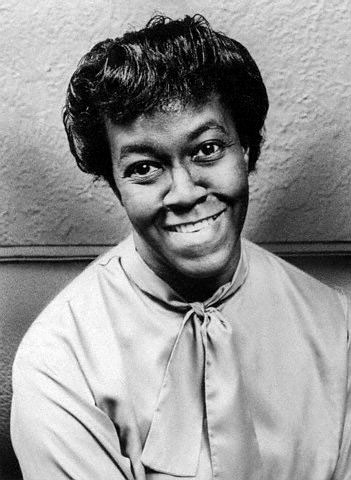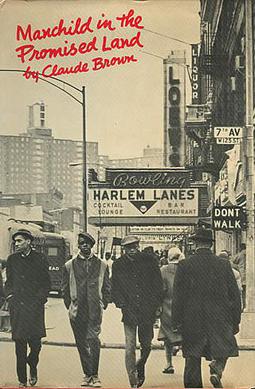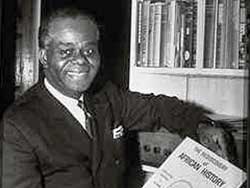
- Launched Negro History Week in 1926, chosen in the second week of February between the birthdays of Frederick Douglass and Abraham Lincoln, which evolved into Black History Month in 1976
- Known for writing the contributions of black Americans into the national spotlight, received a Ph.D at Harvard University
- Founded the Association for the Study of Afro-American Life and History in 1915, founded the Journal of Negro History in 1916
- Author of the book, "The Miseducation of the Negro", published in 1933

-- Carter G. Woodson
"The accounts of the successful strivings of Negroes for enlightenment under most adverse circumstances reads like beautiful romances of a people in an heroic age."
-- Carter G. Woodson
Listen up. Today, the daddy is feeling Black History Month, which is drawing to a close. Specifically, he's thinking that highlighting contributions of African Americans to American history and world civilization should continue.
Historically, we've been conditioned to feel that we made few contributions to society and where we have it was due not to African Americans and folks, female and male, who supported them but some fat white guy from above, usually a president (e.g. Abraham Lincoln or Lyndon Johnson). Little is said about how African Americans such as Frederick Douglass pushed Lincoln or how Dr. Martin Luther King Jr. pushed Johnson by holding marches that embarrassed his administration and America in the eyes of the world-- how it showed America as a nation that professed equality and liberty for all while beating down African Americans with the nerve to demand the right to vote and be treated like any other American human being.
But there is a broader point to be made here: Americans in general don't know their history, especially from people's, or working people's, point of view: history from the ground up by women and men of all races or ethnicities. Unfortunately, in America, history was written largely by upper class males in their image and values with the predictable outcome that it was a history of, by and for white males, usually hypocritical land and slave owners-- people who wrote lofty words about equality and justice as their slaves out back in the fields worked from "sun up to sun down," from "kin to kan't" every day but Sunday. By highlighting black contributions, hopefully it will spur other Americans to take a new look at their own history both as a "race" and as Americans.
Much has been made of the accomplishments of Abraham Lincoln's emancipation proclamation and his efforts to move America toward a equality of opportunity in real life. America's new president, Barack Obama, hails Lincoln as the model he emulates in the oval office. But rarely do we note the horrendous efforts of Andrew Jackson to tear down the gains made by black Americans during the period of reconstruction, efforts that allowed supposedly defeated white southern plantation owners to develop a new southern government and erect Jim Crow laws that essentially placed blacks back into slavery. Nor is there much said of other U.S. presidents who treated African Americans as little more than property or, for that matter, working Americans in general, as little more than day laborers, a status just above indentured servitued with little more than minimum wage and even less rights. And let's not even get started about the genocide perpetrated against Native Americans here on their own land. And how can we forget the treatment of women, who were not allowed to vote until the early 20th centry. The point here is that, if we don't know our history from a people's perspective (as opposed to a class, male-centered perspective), we become vulnerable to others' current interpretation of society and act in ways that is not in our interest. Instead of fighting those who oppress and exploit us all, we end up fighting each other.
Hopefully, the study of black history will spur others to study their history to see where their history also intersects with the history of others: to fathom how all of us have contributed to this country as well as how, at certain points, how we have worked with each other to affect change in our (people's) as well as against each other to forestall such change in this grand experiment we call the United States of America.












 Larry Doby died on June 18, 2003 after a long battle with cancer. He won the battle and is now in a better place. He was believed to be 79.
Larry Doby died on June 18, 2003 after a long battle with cancer. He won the battle and is now in a better place. He was believed to be 79.
 Here's a brief summary of his performance on the ballfield:
Here's a brief summary of his performance on the ballfield:



 Steve Gromek, shown here when he was with the Detroit Tigers, was the winning pitcher for the Indians in that game. He openly and publicly embraced Doby. A picture of Gromek leaping into Doby’s arms made all the front pages. Jerry Izenberg quoted Doby commenting about that event the day before being inducted into the Hall of Fame:
Steve Gromek, shown here when he was with the Detroit Tigers, was the winning pitcher for the Indians in that game. He openly and publicly embraced Doby. A picture of Gromek leaping into Doby’s arms made all the front pages. Jerry Izenberg quoted Doby commenting about that event the day before being inducted into the Hall of Fame:



![Ida Bell Wells-Barnett, 1930.[Credits : Chicago Historical Society,]](http://media-2.web.britannica.com//eb-media/33/5033-004-21A68526.jpg)






















































.gif)















































































